
LEANN
[MLsys2026]: RAG on Everything with LEANN. Enjoy 97% storage savings while running a fast, accurate, and 100% private RAG application on your personal device.
Stars: 9998
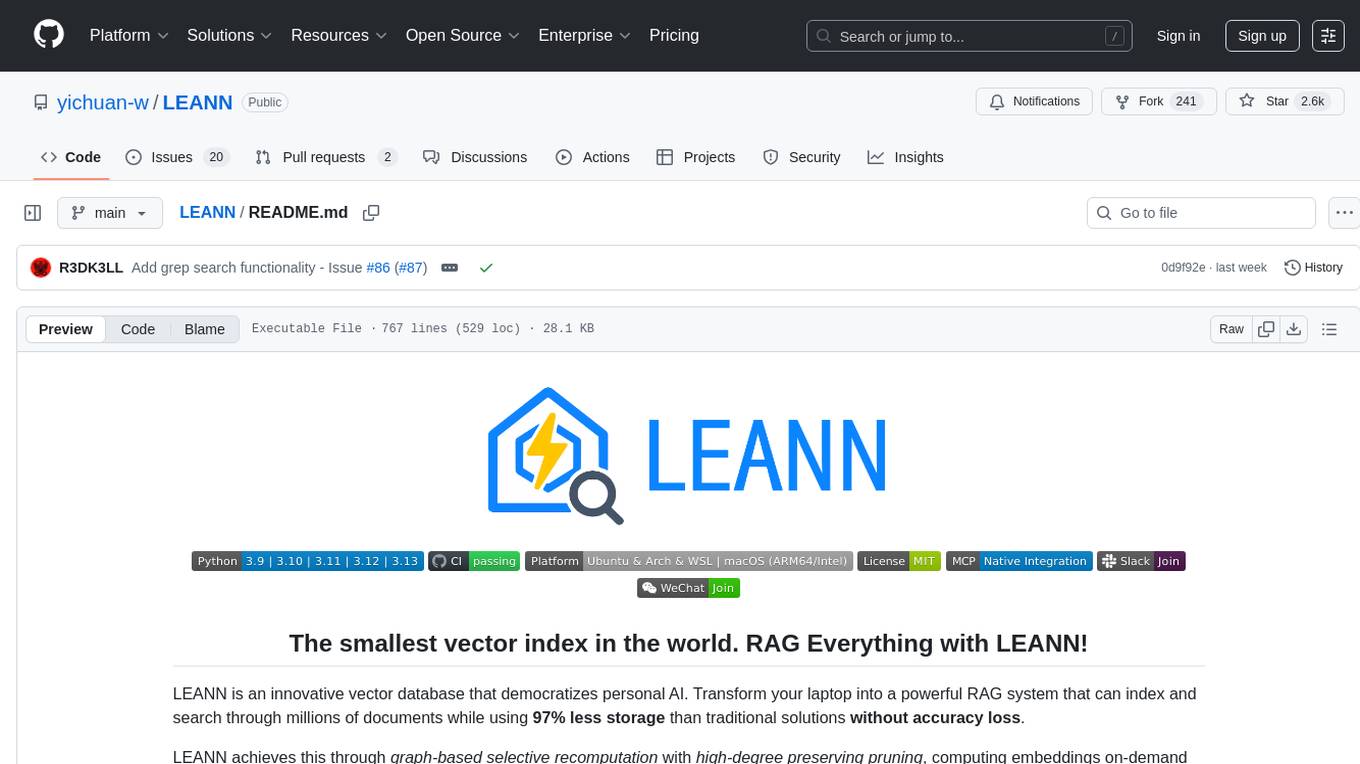
LEANN is an innovative vector database that democratizes personal AI, transforming your laptop into a powerful RAG system that can index and search through millions of documents using 97% less storage than traditional solutions without accuracy loss. It achieves this through graph-based selective recomputation and high-degree preserving pruning, computing embeddings on-demand instead of storing them all. LEANN allows semantic search of file system, emails, browser history, chat history, codebase, or external knowledge bases on your laptop with zero cloud costs and complete privacy. It is a drop-in semantic search MCP service fully compatible with Claude Code, enabling intelligent retrieval without changing your workflow.
README:

We track zero telemetry. This survey is the ONLY way to tell us if you want
GPU Acceleration or More Integrations next.
👉 Click here to cast your vote (2 mins)
We'd love for you to be part of the LEANN community!
👉 Join LEANN Slack
If the invite link has expired or you have trouble joining, please open an issue and we'll help you get in!
LEANN is an innovative vector database that democratizes personal AI. Transform your laptop into a powerful RAG system that can index and search through millions of documents while using 97% less storage than traditional solutions without accuracy loss.
LEANN achieves this through graph-based selective recomputation with high-degree preserving pruning, computing embeddings on-demand instead of storing them all. Illustration Fig → | Paper →
Ready to RAG Everything? Transform your laptop into a personal AI assistant that can semantic search your file system, emails, browser history, chat history (WeChat, iMessage), agent memory (ChatGPT, Claude), live data (Slack, Twitter), codebase* , or external knowledge bases (i.e., 60M documents) - all on your laptop, with zero cloud costs and complete privacy.
* Claude Code only supports basic grep-style keyword search. LEANN is a drop-in semantic search MCP service fully compatible with Claude Code, unlocking intelligent retrieval without changing your workflow. 🔥 Check out the easy setup →
The numbers speak for themselves: Index 60 million text chunks in just 6GB instead of 201GB. From emails to browser history, everything fits on your laptop. See detailed benchmarks for different applications below ↓
🔒 Privacy: Your data never leaves your laptop. No OpenAI, no cloud, no "terms of service".
🪶 Lightweight: Graph-based recomputation eliminates heavy embedding storage, while smart graph pruning and CSR format minimize graph storage overhead. Always less storage, less memory usage!
📦 Portable: Transfer your entire knowledge base between devices (even with others) with minimal cost - your personal AI memory travels with you.
📈 Scalability: Handle messy personal data that would crash traditional vector DBs, easily managing your growing personalized data and agent generated memory!
✨ No Accuracy Loss: Maintain the same search quality as heavyweight solutions while using 97% less storage.
Install uv first if you don't have it. Typically, you can install it with:
curl -LsSf https://astral.sh/uv/install.sh | shClone the repository to access all examples and try amazing applications,
git clone https://github.com/yichuan-w/LEANN.git leann
cd leannand install LEANN from PyPI to run them immediately:
uv venv
source .venv/bin/activate
uv pip install leann
# CPU-only (Linux): use the `cpu` extra (e.g. `leann[cpu]`)🔧 Build from Source (Recommended for development)
git clone https://github.com/yichuan-w/LEANN.git leann
cd leann
git submodule update --init --recursivemacOS:
Note: DiskANN requires MacOS 13.3 or later.
brew install libomp boost protobuf zeromq pkgconf
uv sync --extra diskannLinux (Ubuntu/Debian):
Note: On Ubuntu 20.04, you may need to build a newer Abseil and pin Protobuf (e.g., v3.20.x) for building DiskANN. See Issue #30 for a step-by-step note.
You can manually install Intel oneAPI MKL instead of libmkl-full-dev for DiskANN. You can also use libopenblas-dev for building HNSW only, by removing --extra diskann in the command below.
sudo apt-get update && sudo apt-get install -y \
libomp-dev libboost-all-dev protobuf-compiler libzmq3-dev \
pkg-config libabsl-dev libaio-dev libprotobuf-dev \
libmkl-full-dev
uv sync --extra diskannLinux (Arch Linux):
sudo pacman -Syu && sudo pacman -S --needed base-devel cmake pkgconf git gcc \
boost boost-libs protobuf abseil-cpp libaio zeromq
# For MKL in DiskANN
sudo pacman -S --needed base-devel git
git clone https://aur.archlinux.org/paru-bin.git
cd paru-bin && makepkg -si
paru -S intel-oneapi-mkl intel-oneapi-compiler
source /opt/intel/oneapi/setvars.sh
uv sync --extra diskannLinux (RHEL / CentOS Stream / Oracle / Rocky / AlmaLinux):
See Issue #50 for more details.
sudo dnf groupinstall -y "Development Tools"
sudo dnf install -y libomp-devel boost-devel protobuf-compiler protobuf-devel \
abseil-cpp-devel libaio-devel zeromq-devel pkgconf-pkg-config
# For MKL in DiskANN
sudo dnf install -y intel-oneapi-mkl intel-oneapi-mkl-devel \
intel-oneapi-openmp || sudo dnf install -y intel-oneapi-compiler
source /opt/intel/oneapi/setvars.sh
uv sync --extra diskannOur declarative API makes RAG as easy as writing a config file.
Check out demo.ipynb or
from leann import LeannBuilder, LeannSearcher, LeannChat
from pathlib import Path
INDEX_PATH = str(Path("./").resolve() / "demo.leann")
# Build an index
builder = LeannBuilder(backend_name="hnsw")
builder.add_text("LEANN saves 97% storage compared to traditional vector databases.")
builder.add_text("Tung Tung Tung Sahur called—they need their banana‑crocodile hybrid back")
builder.build_index(INDEX_PATH)
# Search
searcher = LeannSearcher(INDEX_PATH)
results = searcher.search("fantastical AI-generated creatures", top_k=1)
# Chat with your data
chat = LeannChat(INDEX_PATH, llm_config={"type": "hf", "model": "Qwen/Qwen3-0.6B"})
response = chat.ask("How much storage does LEANN save?", top_k=1)LEANN supports RAG on various data sources including documents (.pdf, .txt, .md), Apple Mail, Google Search History, WeChat, ChatGPT conversations, Claude conversations, iMessage conversations, and live data from any platform through MCP (Model Context Protocol) servers - including Slack, Twitter, and more.
LEANN supports many LLM providers for text generation (HuggingFace, Ollama, Anthropic, and Any OpenAI compatible API).
🔑 OpenAI API Setup (Default)
Set your OpenAI API key as an environment variable:
export OPENAI_API_KEY="your-api-key-here"Make sure to use --llm openai flag when using the CLI.
You can also specify the model name with --llm-model <model-name> flag.
🛠️ Supported LLM & Embedding Providers (via OpenAI Compatibility)
Thanks to the widespread adoption of the OpenAI API format, LEANN is compatible out-of-the-box with a vast array of LLM and embedding providers. Simply set the OPENAI_BASE_URL and OPENAI_API_KEY environment variables to connect to your preferred service.
export OPENAI_API_KEY="xxx"
export OPENAI_BASE_URL="http://localhost:1234/v1" # base url of the providerTo use OpenAI compatible endpoint with the CLI interface:
If you are using it for text generation, make sure to use --llm openai flag and specify the model name with --llm-model <model-name> flag.
If you are using it for embedding, set the --embedding-mode openai flag and specify the model name with --embedding-model <MODEL>.
Below is a list of base URLs for common providers to get you started.
| Provider | Sample Base URL |
|---|---|
| Ollama | http://localhost:11434/v1 |
| LM Studio | http://localhost:1234/v1 |
| vLLM | http://localhost:8000/v1 |
| llama.cpp | http://localhost:8080/v1 |
| SGLang | http://localhost:30000/v1 |
| LiteLLM | http://localhost:4000 |
🚨 A Note on Privacy: Before choosing a cloud provider, carefully review their privacy and data retention policies. Depending on their terms, your data may be used for their own purposes, including but not limited to human reviews and model training, which can lead to serious consequences if not handled properly.
| Provider | Base URL |
|---|---|
| OpenAI | https://api.openai.com/v1 |
| OpenRouter | https://openrouter.ai/api/v1 |
| Gemini | https://generativelanguage.googleapis.com/v1beta/openai/ |
| x.AI (Grok) | https://api.x.ai/v1 |
| Groq AI | https://api.groq.com/openai/v1 |
| DeepSeek | https://api.deepseek.com/v1 |
| SiliconFlow | https://api.siliconflow.cn/v1 |
| Zhipu (BigModel) | https://open.bigmodel.cn/api/paas/v4/ |
| Mistral AI | https://api.mistral.ai/v1 |
| Anthropic | https://api.anthropic.com/v1 |
| Jina AI (Embeddings) | https://api.jina.ai/v1 |
💡 Tip: Separate Embedding Provider
To use a different provider for embeddings (e.g., Jina AI) while using another for LLM, use
--embedding-api-baseand--embedding-api-key:leann build my-index --docs ./docs \ --embedding-mode openai \ --embedding-model jina-embeddings-v3 \ --embedding-api-base https://api.jina.ai/v1 \ --embedding-api-key $JINA_API_KEY
If your provider isn't on this list, don't worry! Check their documentation for an OpenAI-compatible endpoint—chances are, it's OpenAI Compatible too!
🔧 Ollama Setup (Recommended for full privacy)
macOS:
First, download Ollama for macOS.
# Pull a lightweight model (recommended for consumer hardware)
ollama pull llama3.2:1bLinux:
# Install Ollama
curl -fsSL https://ollama.ai/install.sh | sh
# Start Ollama service manually
ollama serve &
# Pull a lightweight model (recommended for consumer hardware)
ollama pull llama3.2:1bLEANN provides flexible parameters for embedding models, search strategies, and data processing to fit your specific needs.
📚 Need configuration best practices? Check our Configuration Guide for detailed optimization tips, model selection advice, and solutions to common issues like slow embeddings or poor search quality.
📋 Click to expand: Common Parameters (Available in All Examples)
All RAG examples share these common parameters. Interactive mode is available in all examples - simply run without --query to start a continuous Q&A session where you can ask multiple questions. Type 'quit' to exit.
# Environment Variables (GPU Device Selection)
LEANN_EMBEDDING_DEVICE # GPU for embedding model (e.g., cuda:0, cuda:1, cpu)
LEANN_LLM_DEVICE # GPU for HFChat LLM (e.g., cuda:1, or "cuda" for multi-GPU auto)
# Core Parameters (General preprocessing for all examples)
--index-dir DIR # Directory to store the index (default: current directory)
--query "YOUR QUESTION" # Single query mode. Omit for interactive chat (type 'quit' to exit), and now you can play with your index interactively
--max-items N # Limit data preprocessing (default: -1, process all data)
--force-rebuild # Force rebuild index even if it exists
# Embedding Parameters
--embedding-model MODEL # e.g., facebook/contriever, text-embedding-3-small, mlx-community/Qwen3-Embedding-0.6B-8bit or nomic-embed-text
--embedding-mode MODE # sentence-transformers, openai, mlx, or ollama
# LLM Parameters (Text generation models)
--llm TYPE # LLM backend: openai, ollama, hf, or anthropic (default: openai)
--llm-model MODEL # Model name (default: gpt-4o) e.g., gpt-4o-mini, llama3.2:1b, Qwen/Qwen2.5-1.5B-Instruct
--thinking-budget LEVEL # Thinking budget for reasoning models: low/medium/high (supported by o3, o3-mini, GPT-Oss:20b, and other reasoning models)
# Search Parameters
--top-k N # Number of results to retrieve (default: 20)
--search-complexity N # Search complexity for graph traversal (default: 32)
# Chunking Parameters
--chunk-size N # Size of text chunks (default varies by source: 256 for most, 192 for WeChat)
--chunk-overlap N # Overlap between chunks (default varies: 25-128 depending on source)
# Index Building Parameters
--backend-name NAME # Backend to use: hnsw or diskann (default: hnsw)
--graph-degree N # Graph degree for index construction (default: 32)
--build-complexity N # Build complexity for index construction (default: 64)
--compact / --no-compact # Use compact storage (default: true). Must be `no-compact` for `no-recompute` build.
--recompute / --no-recompute # Enable/disable embedding recomputation (default: enabled). Should not do a `no-recompute` search in a `recompute` build.Ask questions directly about your personal PDFs, documents, and any directory containing your files!
The example below asks a question about summarizing our paper (uses default data in data/, which is a directory with diverse data sources: two papers, Pride and Prejudice, and a Technical report about LLM in Huawei in Chinese), and this is the easiest example to run here:
source .venv/bin/activate # Don't forget to activate the virtual environment
python -m apps.document_rag --query "What are the main techniques LEANN explores?"📋 Click to expand: Document-Specific Arguments
--data-dir DIR # Directory containing documents to process (default: data)
--file-types .ext .ext # Filter by specific file types (optional - all LlamaIndex supported types if omitted)# Process all documents with larger chunks for academic papers
python -m apps.document_rag --data-dir "~/Documents/Papers" --chunk-size 1024
# Filter only markdown and Python files with smaller chunks
python -m apps.document_rag --data-dir "./docs" --chunk-size 256 --file-types .md .py
# Enable AST-aware chunking for code files
python -m apps.document_rag --enable-code-chunking --data-dir "./my_project"
# Or use the specialized code RAG for better code understanding
python -m apps.code_rag --repo-dir "./my_codebase" --query "How does authentication work?"Search through PDFs using both text and visual understanding with ColQwen2/ColPali models. Perfect for research papers, technical documents, and any PDFs with complex layouts, figures, or diagrams.
🍎 Mac Users: ColQwen is optimized for Apple Silicon with MPS acceleration for faster inference!
# Build index from PDFs
python -m apps.colqwen_rag build --pdfs ./my_papers/ --index research_papers
# Search with text queries
python -m apps.colqwen_rag search research_papers "How does attention mechanism work?"
# Interactive Q&A
python -m apps.colqwen_rag ask research_papers --interactive📋 Click to expand: ColQwen Setup & Usage
# Install dependencies
uv pip install colpali_engine pdf2image pillow matplotlib qwen_vl_utils einops seaborn
brew install poppler # macOS only, for PDF processingpython -m apps.colqwen_rag build \
--pdfs ./pdf_directory/ \
--index my_index \
--model colqwen2 # or colpalipython -m apps.colqwen_rag search my_index "your question here" --top-k 5-
ColQwen2 (
colqwen2): Latest vision-language model with improved performance -
ColPali (
colpali): Proven multimodal retriever
For detailed usage, see the ColQwen Guide.
Note: The examples below currently support macOS only. Windows support coming soon.
Before running the example below, you need to grant full disk access to your terminal/VS Code in System Preferences → Privacy & Security → Full Disk Access.
python -m apps.email_rag --query "What's the food I ordered by DoorDash or Uber Eats mostly?"780K email chunks → 78MB storage. Finally, search your email like you search Google.
📋 Click to expand: Email-Specific Arguments
--mail-path PATH # Path to specific mail directory (auto-detects if omitted)
--include-html # Include HTML content in processing (useful for newsletters)# Search work emails from a specific account
python -m apps.email_rag --mail-path "~/Library/Mail/V10/WORK_ACCOUNT"
# Find all receipts and order confirmations (includes HTML)
python -m apps.email_rag --query "receipt order confirmation invoice" --include-html📋 Click to expand: Example queries you can try
Once the index is built, you can ask questions like:
- "Find emails from my boss about deadlines"
- "What did John say about the project timeline?"
- "Show me emails about travel expenses"
python -m apps.browser_rag --query "Tell me my browser history about machine learning?"38K browser entries → 6MB storage. Your browser history becomes your personal search engine.
📋 Click to expand: Browser-Specific Arguments
--chrome-profile PATH # Path to Chrome profile directory (auto-detects if omitted)# Search academic research from your browsing history
python -m apps.browser_rag --query "arxiv papers machine learning transformer architecture"
# Track competitor analysis across work profile
python -m apps.browser_rag --chrome-profile "~/Library/Application Support/Google/Chrome/Work Profile" --max-items 5000📋 Click to expand: How to find your Chrome profile
The default Chrome profile path is configured for a typical macOS setup. If you need to find your specific Chrome profile:
- Open Terminal
- Run:
ls ~/Library/Application\ Support/Google/Chrome/ - Look for folders like "Default", "Profile 1", "Profile 2", etc.
- Use the full path as your
--chrome-profileargument
Common Chrome profile locations:
- macOS:
~/Library/Application Support/Google/Chrome/Default - Linux:
~/.config/google-chrome/Default
💬 Click to expand: Example queries you can try
Once the index is built, you can ask questions like:
- "What websites did I visit about machine learning?"
- "Find my search history about programming"
- "What YouTube videos did I watch recently?"
- "Show me websites I visited about travel planning"
python -m apps.wechat_rag --query "Show me all group chats about weekend plans"400K messages → 64MB storage Search years of chat history in any language.
🔧 Click to expand: Installation Requirements
First, you need to install the WeChat exporter,
brew install sunnyyoung/repo/wechattweak-clior install it manually (if you have issues with Homebrew):
sudo packages/wechat-exporter/wechattweak-cli installTroubleshooting:
- Installation issues: Check the WeChatTweak-CLI issues page
-
Export errors: If you encounter the error below, try restarting WeChat
Failed to export WeChat data. Please ensure WeChat is running and WeChatTweak is installed. Failed to find or export WeChat data. Exiting.
📋 Click to expand: WeChat-Specific Arguments
--export-dir DIR # Directory to store exported WeChat data (default: wechat_export_direct)
--force-export # Force re-export even if data exists# Search for travel plans discussed in group chats
python -m apps.wechat_rag --query "travel plans" --max-items 10000
# Re-export and search recent chats (useful after new messages)
python -m apps.wechat_rag --force-export --query "work schedule"💬 Click to expand: Example queries you can try
Once the index is built, you can ask questions like:
- "我想买魔术师约翰逊的球衣,给我一些对应聊天记录?" (Chinese: Show me chat records about buying Magic Johnson's jersey)
Transform your ChatGPT conversations into a searchable knowledge base! Search through all your ChatGPT discussions about coding, research, brainstorming, and more.
python -m apps.chatgpt_rag --export-path chatgpt_export.html --query "How do I create a list in Python?"Unlock your AI conversation history. Never lose track of valuable insights from your ChatGPT discussions again.
📋 Click to expand: How to Export ChatGPT Data
Step-by-step export process:
- Sign in to ChatGPT
- Click your profile icon in the top right corner
- Navigate to Settings → Data Controls
- Click "Export" under Export Data
- Confirm the export request
- Download the ZIP file from the email link (expires in 24 hours)
- Extract or use directly with LEANN
Supported formats:
-
.htmlfiles from ChatGPT exports -
.ziparchives from ChatGPT - Directories with multiple export files
📋 Click to expand: ChatGPT-Specific Arguments
--export-path PATH # Path to ChatGPT export file (.html/.zip) or directory (default: ./chatgpt_export)
--separate-messages # Process each message separately instead of concatenated conversations
--chunk-size N # Text chunk size (default: 512)
--chunk-overlap N # Overlap between chunks (default: 128)# Basic usage with HTML export
python -m apps.chatgpt_rag --export-path conversations.html
# Process ZIP archive from ChatGPT
python -m apps.chatgpt_rag --export-path chatgpt_export.zip
# Search with specific query
python -m apps.chatgpt_rag --export-path chatgpt_data.html --query "Python programming help"
# Process individual messages for fine-grained search
python -m apps.chatgpt_rag --separate-messages --export-path chatgpt_export.html
# Process directory containing multiple exports
python -m apps.chatgpt_rag --export-path ./chatgpt_exports/ --max-items 1000💡 Click to expand: Example queries you can try
Once your ChatGPT conversations are indexed, you can search with queries like:
- "What did I ask ChatGPT about Python programming?"
- "Show me conversations about machine learning algorithms"
- "Find discussions about web development frameworks"
- "What coding advice did ChatGPT give me?"
- "Search for conversations about debugging techniques"
- "Find ChatGPT's recommendations for learning resources"
Transform your Claude conversations into a searchable knowledge base! Search through all your Claude discussions about coding, research, brainstorming, and more.
python -m apps.claude_rag --export-path claude_export.json --query "What did I ask about Python dictionaries?"Unlock your AI conversation history. Never lose track of valuable insights from your Claude discussions again.
📋 Click to expand: How to Export Claude Data
Step-by-step export process:
- Open Claude in your browser
- Navigate to Settings (look for gear icon or settings menu)
- Find Export/Download options in your account settings
- Download conversation data (usually in JSON format)
- Place the file in your project directory
Note: Claude export methods may vary depending on the interface you're using. Check Claude's help documentation for the most current export instructions.
Supported formats:
-
.jsonfiles (recommended) -
.ziparchives containing JSON data - Directories with multiple export files
📋 Click to expand: Claude-Specific Arguments
--export-path PATH # Path to Claude export file (.json/.zip) or directory (default: ./claude_export)
--separate-messages # Process each message separately instead of concatenated conversations
--chunk-size N # Text chunk size (default: 512)
--chunk-overlap N # Overlap between chunks (default: 128)# Basic usage with JSON export
python -m apps.claude_rag --export-path my_claude_conversations.json
# Process ZIP archive from Claude
python -m apps.claude_rag --export-path claude_export.zip
# Search with specific query
python -m apps.claude_rag --export-path claude_data.json --query "machine learning advice"
# Process individual messages for fine-grained search
python -m apps.claude_rag --separate-messages --export-path claude_export.json
# Process directory containing multiple exports
python -m apps.claude_rag --export-path ./claude_exports/ --max-items 1000💡 Click to expand: Example queries you can try
Once your Claude conversations are indexed, you can search with queries like:
- "What did I ask Claude about Python programming?"
- "Show me conversations about machine learning algorithms"
- "Find discussions about software architecture patterns"
- "What debugging advice did Claude give me?"
- "Search for conversations about data structures"
- "Find Claude's recommendations for learning resources"
Transform your iMessage conversations into a searchable knowledge base! Search through all your text messages, group chats, and conversations with friends, family, and colleagues.
python -m apps.imessage_rag --query "What did we discuss about the weekend plans?"Unlock your message history. Never lose track of important conversations, shared links, or memorable moments from your iMessage history.
📋 Click to expand: How to Access iMessage Data
iMessage data location:
iMessage conversations are stored in a SQLite database on your Mac at:
~/Library/Messages/chat.db
Important setup requirements:
-
Grant Full Disk Access to your terminal or IDE:
- Open System Preferences → Security & Privacy → Privacy
- Select Full Disk Access from the left sidebar
- Click the + button and add your terminal app (Terminal, iTerm2) or IDE (VS Code, etc.)
- Restart your terminal/IDE after granting access
-
Alternative: Use a backup database
- If you have Time Machine backups or manual copies of the database
- Use
--db-pathto specify a custom location
Supported formats:
- Direct access to
~/Library/Messages/chat.db(default) - Custom database path with
--db-path - Works with backup copies of the database
📋 Click to expand: iMessage-Specific Arguments
--db-path PATH # Path to chat.db file (default: ~/Library/Messages/chat.db)
--concatenate-conversations # Group messages by conversation (default: True)
--no-concatenate-conversations # Process each message individually
--chunk-size N # Text chunk size (default: 1000)
--chunk-overlap N # Overlap between chunks (default: 200)# Basic usage (requires Full Disk Access)
python -m apps.imessage_rag
# Search with specific query
python -m apps.imessage_rag --query "family dinner plans"
# Use custom database path
python -m apps.imessage_rag --db-path /path/to/backup/chat.db
# Process individual messages instead of conversations
python -m apps.imessage_rag --no-concatenate-conversations
# Limit processing for testing
python -m apps.imessage_rag --max-items 100 --query "weekend"💡 Click to expand: Example queries you can try
Once your iMessage conversations are indexed, you can search with queries like:
- "What did we discuss about vacation plans?"
- "Find messages about restaurant recommendations"
- "Show me conversations with John about the project"
- "Search for shared links about technology"
- "Find group chat discussions about weekend events"
- "What did mom say about the family gathering?"
Connect to live data sources through the Model Context Protocol (MCP). LEANN now supports real-time RAG on platforms like Slack, Twitter, and more through standardized MCP servers.
Key Benefits:
- Live Data Access: Fetch real-time data without manual exports
- Standardized Protocol: Use any MCP-compatible server
- Easy Extension: Add new platforms with minimal code
- Secure Access: MCP servers handle authentication
Transform your Slack workspace into a searchable knowledge base! Find discussions, decisions, and shared knowledge across all your channels.
# Test MCP server connection
python -m apps.slack_rag --mcp-server "slack-mcp-server" --test-connection
# Index and search Slack messages
python -m apps.slack_rag \
--mcp-server "slack-mcp-server" \
--workspace-name "my-team" \
--channels general dev-team random \
--query "What did we decide about the product launch?"📖 Comprehensive Setup Guide: For detailed setup instructions, troubleshooting common issues (like "users cache is not ready yet"), and advanced configuration options, see our Slack Setup Guide.
Quick Setup:
- Install a Slack MCP server (e.g.,
npm install -g slack-mcp-server) - Create a Slack App and get API credentials (see detailed guide above)
- Set environment variables:
export SLACK_BOT_TOKEN="xoxb-your-bot-token" export SLACK_APP_TOKEN="xapp-your-app-token" # Optional
- Test connection with
--test-connectionflag
Arguments:
-
--mcp-server: Command to start the Slack MCP server -
--workspace-name: Slack workspace name for organization -
--channels: Specific channels to index (optional) -
--concatenate-conversations: Group messages by channel (default: true) -
--max-messages-per-channel: Limit messages per channel (default: 100) -
--max-retries: Maximum retries for cache sync issues (default: 5) -
--retry-delay: Initial delay between retries in seconds (default: 2.0)
Search through your Twitter bookmarks! Find that perfect article, thread, or insight you saved for later.
# Test MCP server connection
python -m apps.twitter_rag --mcp-server "twitter-mcp-server" --test-connection
# Index and search Twitter bookmarks
python -m apps.twitter_rag \
--mcp-server "twitter-mcp-server" \
--max-bookmarks 1000 \
--query "What AI articles did I bookmark about machine learning?"Setup Requirements:
- Install a Twitter MCP server (e.g.,
npm install -g twitter-mcp-server) - Get Twitter API credentials:
- Apply for a Twitter Developer Account at developer.twitter.com
- Create a new app in the Twitter Developer Portal
- Generate API keys and access tokens with "Read" permissions
- For bookmarks access, you may need Twitter API v2 with appropriate scopes
export TWITTER_API_KEY="your-api-key" export TWITTER_API_SECRET="your-api-secret" export TWITTER_ACCESS_TOKEN="your-access-token" export TWITTER_ACCESS_TOKEN_SECRET="your-access-token-secret"
- Test connection with
--test-connectionflag
Arguments:
-
--mcp-server: Command to start the Twitter MCP server -
--username: Filter bookmarks by username (optional) -
--max-bookmarks: Maximum bookmarks to fetch (default: 1000) -
--no-tweet-content: Exclude tweet content, only metadata -
--no-metadata: Exclude engagement metadata
💡 Click to expand: Example queries you can try
Slack Queries:
- "What did the team discuss about the project deadline?"
- "Find messages about the new feature launch"
- "Show me conversations about budget planning"
- "What decisions were made in the dev-team channel?"
Twitter Queries:
- "What AI articles did I bookmark last month?"
- "Find tweets about machine learning techniques"
- "Show me bookmarked threads about startup advice"
- "What Python tutorials did I save?"
Want to use MCP data with regular LEANN CLI? You can combine MCP apps with CLI commands:
# Step 1: Use MCP app to fetch and index data
python -m apps.slack_rag --mcp-server "slack-mcp-server" --workspace-name "my-team"
# Step 2: The data is now indexed and available via CLI
leann search slack_messages "project deadline"
leann ask slack_messages "What decisions were made about the product launch?"
# Same for Twitter bookmarks
python -m apps.twitter_rag --mcp-server "twitter-mcp-server"
leann search twitter_bookmarks "machine learning articles"MCP vs Manual Export:
- MCP: Live data, automatic updates, requires server setup
- Manual Export: One-time setup, works offline, requires manual data export
🔧 Adding New MCP Platforms
Want to add support for other platforms? LEANN's MCP integration is designed for easy extension:
- Find or create an MCP server for your platform
-
Create a reader class following the pattern in
apps/slack_data/slack_mcp_reader.py -
Create a RAG application following the pattern in
apps/slack_rag.py - Test and contribute back to the community!
Popular MCP servers to explore:
- GitHub repositories and issues
- Discord messages
- Notion pages
- Google Drive documents
- And many more in the MCP ecosystem!
AST‑Aware Code Chunking
LEANN features intelligent code chunking that preserves semantic boundaries (functions, classes, methods) for Python, Java, C#, and TypeScript, improving code understanding compared to text-based chunking.
📖 Read the AST Chunking Guide →
The future of code assistance is here. Transform your development workflow with LEANN's native MCP integration for Claude Code. Index your entire codebase and get intelligent code assistance directly in your IDE.
Key features:
- 🔍 Semantic code search across your entire project, fully local index and lightweight
- 🧠 AST-aware chunking preserves code structure (functions, classes)
- 📚 Context-aware assistance for debugging and development
- 🚀 Zero-config setup with automatic language detection
# Install LEANN globally for MCP integration
uv tool install leann-core --with leann
claude mcp add --scope user leann-server -- leann_mcp
# Setup is automatic - just start using Claude Code!Try our fully agentic pipeline with auto query rewriting, semantic search planning, and more:
🔥 Ready to supercharge your coding? Complete Setup Guide →
LEANN includes a powerful CLI for document processing and search. Perfect for quick document indexing and interactive chat.
If you followed the Quick Start, leann is already installed in your virtual environment:
source .venv/bin/activate
leann --helpTo make it globally available:
# Install the LEANN CLI globally using uv tool
uv tool install leann-core --with leann
# Now you can use leann from anywhere without activating venv
leann --helpNote: Global installation is required for Claude Code integration. The
leann_mcpserver depends on the globally availableleanncommand.
# build from a specific directory, and my_docs is the index name(Here you can also build from multiple dict or multiple files)
leann build my-docs --docs ./your_documents
# Search your documents
leann search my-docs "machine learning concepts"
# Interactive chat with your documents
leann ask my-docs --interactive
# Ask a single question (non-interactive)
leann ask my-docs "Where are prompts configured?"
# Detect file changes since last build/watch checkpoint
leann watch my-docs
# List all your indexes
leann list
# Remove an index
leann remove my-docsKey CLI features:
- Auto-detects document formats (PDF, TXT, MD, DOCX, PPTX + code files)
- 🧠 AST-aware chunking for Python, Java, C#, TypeScript files
- Smart text chunking with overlap for all other content
-
📂 File change detection via Merkle tree snapshots (
leann watch) - Multiple LLM providers (Ollama, OpenAI, HuggingFace)
- Organized index storage in
.leann/indexes/(project-local) - Support for advanced search parameters
📋 Click to expand: Complete CLI Reference
You can use leann --help, or leann build --help, leann search --help, leann watch --help, leann ask --help, leann list --help, leann remove --help to get the complete CLI reference.
Build Command:
leann build INDEX_NAME --docs DIRECTORY|FILE [DIRECTORY|FILE ...] [OPTIONS]
Options:
--backend {hnsw,diskann} Backend to use (default: hnsw)
--embedding-model MODEL Embedding model (default: facebook/contriever)
--graph-degree N Graph degree (default: 32)
--complexity N Build complexity (default: 64)
--force Force rebuild existing index
--compact / --no-compact Use compact storage (default: true). Must be `no-compact` for `no-recompute` build.
--recompute / --no-recompute Enable recomputation (default: true)Search Command:
leann search INDEX_NAME QUERY [OPTIONS]
Options:
--top-k N Number of results (default: 5)
--complexity N Search complexity (default: 64)
--recompute / --no-recompute Enable/disable embedding recomputation (default: enabled). Should not do a `no-recompute` search in a `recompute` build.
--pruning-strategy {global,local,proportional}Watch Command:
leann watch INDEX_NAME
# Compares the current file system state against the last checkpoint (Merkle tree snapshot)
# and reports which files have been added, removed, or modified, along with their chunk IDs.
#
# - Automatically saves a new checkpoint after detecting changes
# - Each subsequent run compares against the most recent checkpoint
# - File change detection uses SHA-256 content hashing via a Merkle tree
#
# Example output:
# === Changes since last checkpoint ===
# modified (1):
# - /path/to/file.py
# chunks: 42, 43, 44Ask Command:
leann ask INDEX_NAME [OPTIONS]
Options:
--llm {ollama,openai,hf,anthropic} LLM provider (default: ollama)
--model MODEL Model name (default: qwen3:8b)
--interactive Interactive chat mode
--top-k N Retrieval count (default: 20)List Command:
leann list
# Lists all indexes across all projects with status indicators:
# ✅ - Index is complete and ready to use
# ❌ - Index is incomplete or corrupted
# 📁 - CLI-created index (in .leann/indexes/)
# 📄 - App-created index (*.leann.meta.json files)Remove Command:
leann remove INDEX_NAME [OPTIONS]
Options:
--force, -f Force removal without confirmation
# Smart removal: automatically finds and safely removes indexes
# - Shows all matching indexes across projects
# - Requires confirmation for cross-project removal
# - Interactive selection when multiple matches found
# - Supports both CLI and app-created indexesLEANN supports a simple metadata filtering system to enable sophisticated use cases like document filtering by date/type, code search by file extension, and content management based on custom criteria.
# Add metadata during indexing
builder.add_text(
"def authenticate_user(token): ...",
metadata={"file_extension": ".py", "lines_of_code": 25}
)
# Search with filters
results = searcher.search(
query="authentication function",
metadata_filters={
"file_extension": {"==": ".py"},
"lines_of_code": {"<": 100}
}
)Supported operators: ==, !=, <, <=, >, >=, in, not_in, contains, starts_with, ends_with, is_true, is_false
📖 Complete Metadata filtering guide →
For exact text matching instead of semantic search, use the use_grep parameter:
# Exact text search
results = searcher.search("banana‑crocodile", use_grep=True, top_k=1)Use cases: Finding specific code patterns, error messages, function names, or exact phrases where semantic similarity isn't needed.
📖 Complete grep search guide →
The magic: Most vector DBs store every single embedding (expensive). LEANN stores a pruned graph structure (cheap) and recomputes embeddings only when needed (fast).
Core techniques:
- Graph-based selective recomputation: Only compute embeddings for nodes in the search path
- High-degree preserving pruning: Keep important "hub" nodes while removing redundant connections
- Dynamic batching: Efficiently batch embedding computations for GPU utilization
- Two-level search: Smart graph traversal that prioritizes promising nodes
Backends:
- HNSW (default): Ideal for most datasets with maximum storage savings through full recomputation
- DiskANN: Advanced option with superior search performance, using PQ-based graph traversal with real-time reranking for the best speed-accuracy trade-off
DiskANN vs HNSW Performance Comparison → - Compare search performance between both backends
Simple Example: Compare LEANN vs FAISS → - See storage savings in action
| System | DPR (2.1M) | Wiki (60M) | Chat (400K) | Email (780K) | Browser (38K) |
|---|---|---|---|---|---|
| Traditional vector database (e.g., FAISS) | 3.8 GB | 201 GB | 1.8 GB | 2.4 GB | 130 MB |
| LEANN | 324 MB | 6 GB | 64 MB | 79 MB | 6.4 MB |
| Savings | 91% | 97% | 97% | 97% | 95% |
uv run benchmarks/run_evaluation.py # Will auto-download evaluation data and run benchmarks
uv run benchmarks/run_evaluation.py benchmarks/data/indices/rpj_wiki/rpj_wiki --num-queries 2000 # After downloading data, you can run the benchmark with our biggest indexThe evaluation script downloads data automatically on first run. The last three results were tested with partial personal data, and you can reproduce them with your own data!
If you find Leann useful, please cite:
LEANN: A Low-Storage Vector Index
@misc{wang2025leannlowstoragevectorindex,
title={LEANN: A Low-Storage Vector Index},
author={Yichuan Wang and Shu Liu and Zhifei Li and Yongji Wu and Ziming Mao and Yilong Zhao and Xiao Yan and Zhiying Xu and Yang Zhou and Ion Stoica and Sewon Min and Matei Zaharia and Joseph E. Gonzalez},
year={2025},
eprint={2506.08276},
archivePrefix={arXiv},
primaryClass={cs.DB},
url={https://arxiv.org/abs/2506.08276},
}❓ FAQ →
MIT License - see LICENSE for details.
Core Contributors: Yichuan Wang & Zhifei Li.
Active Contributors: Gabriel Dehan, Aakash Suresh
We welcome more contributors! Feel free to open issues or submit PRs.
This work is done at Berkeley Sky Computing Lab.
⭐ Star us on GitHub if Leann is useful for your research or applications!
Made with ❤️ by the Leann team
LEANN is indexed on DeepWiki, so you can ask questions to LLMs using Deep Research to explore the codebase and get help to add new features.
For Tasks:
Click tags to check more tools for each tasksFor Jobs:
Alternative AI tools for LEANN
Similar Open Source Tools

LEANN
LEANN is an innovative vector database that democratizes personal AI, transforming your laptop into a powerful RAG system that can index and search through millions of documents using 97% less storage than traditional solutions without accuracy loss. It achieves this through graph-based selective recomputation and high-degree preserving pruning, computing embeddings on-demand instead of storing them all. LEANN allows semantic search of file system, emails, browser history, chat history, codebase, or external knowledge bases on your laptop with zero cloud costs and complete privacy. It is a drop-in semantic search MCP service fully compatible with Claude Code, enabling intelligent retrieval without changing your workflow.
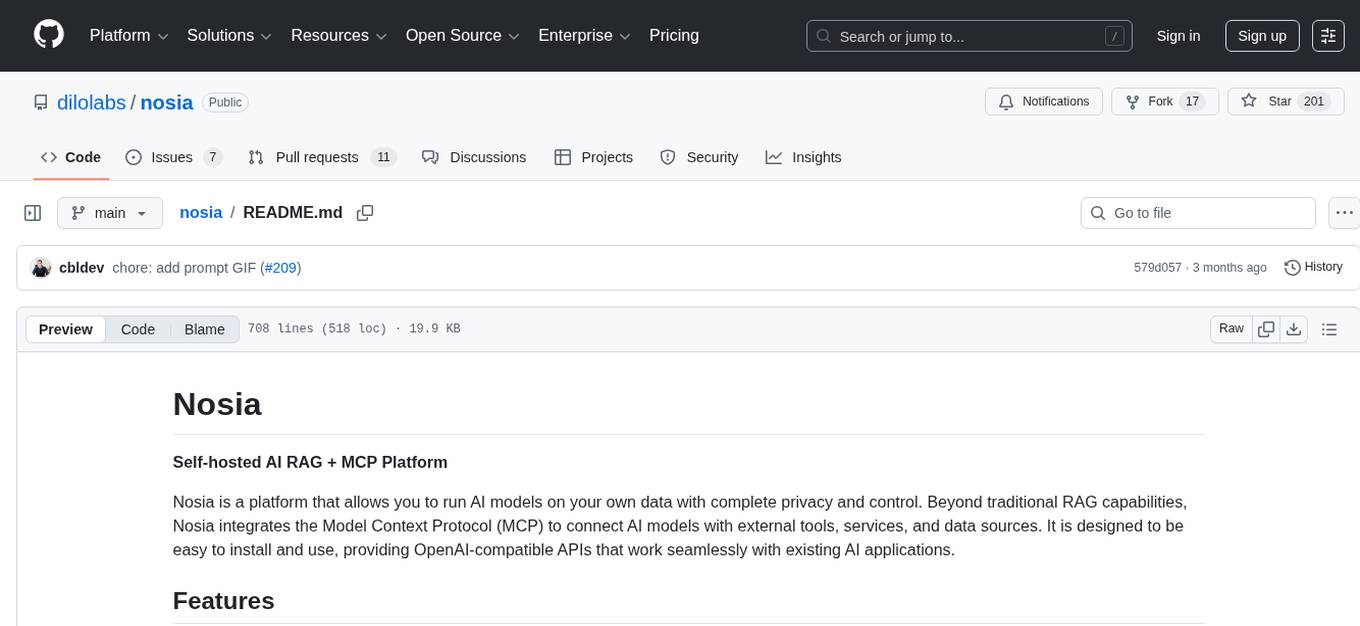
nosia
Nosia is a self-hosted AI RAG + MCP platform that allows users to run AI models on their own data with complete privacy and control. It integrates the Model Context Protocol (MCP) to connect AI models with external tools, services, and data sources. The platform is designed to be easy to install and use, providing OpenAI-compatible APIs that work seamlessly with existing AI applications. Users can augment AI responses with their documents, perform real-time streaming, support multi-format data, enable semantic search, and achieve easy deployment with Docker Compose. Nosia also offers multi-tenancy for secure data separation.
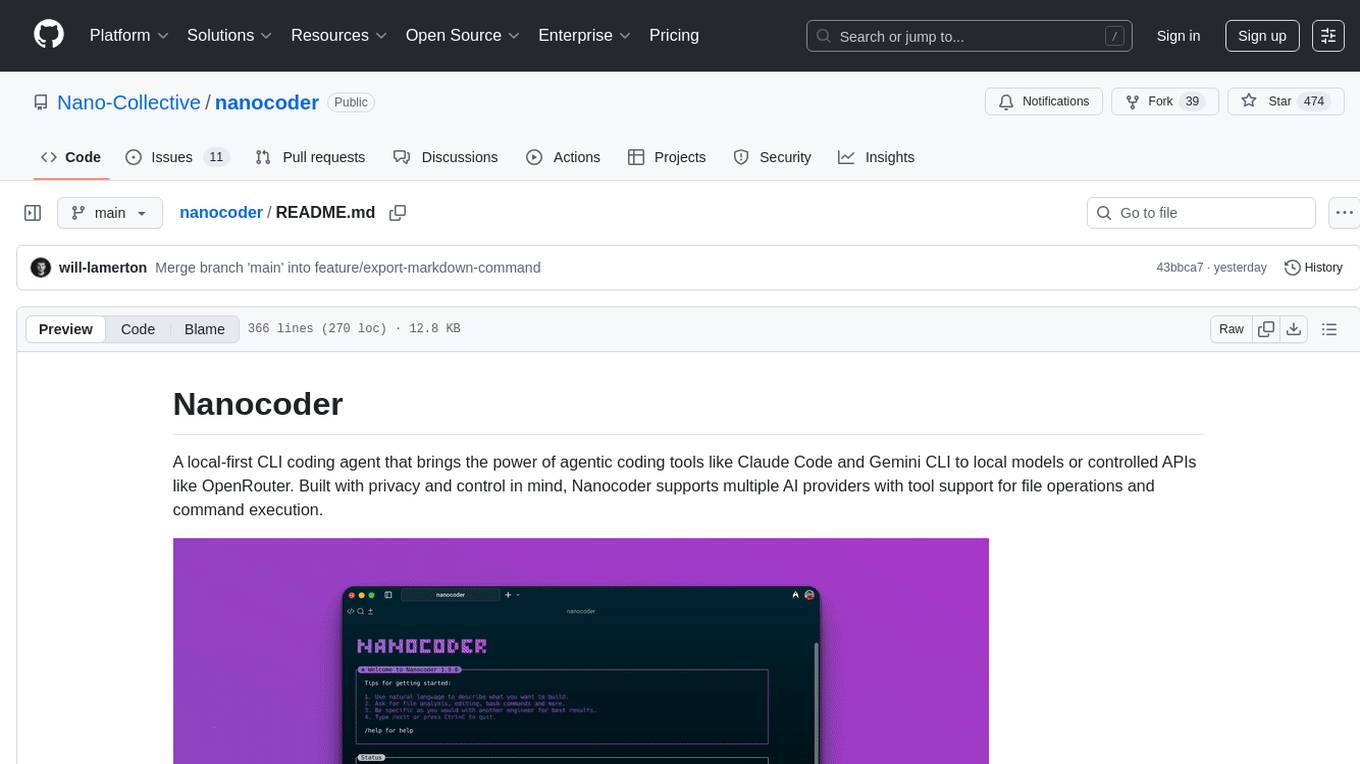
nanocoder
Nanocoder is a versatile code editor designed for beginners and experienced programmers alike. It provides a user-friendly interface with features such as syntax highlighting, code completion, and error checking. With Nanocoder, you can easily write and debug code in various programming languages, making it an ideal tool for learning, practicing, and developing software projects. Whether you are a student, hobbyist, or professional developer, Nanocoder offers a seamless coding experience to boost your productivity and creativity.
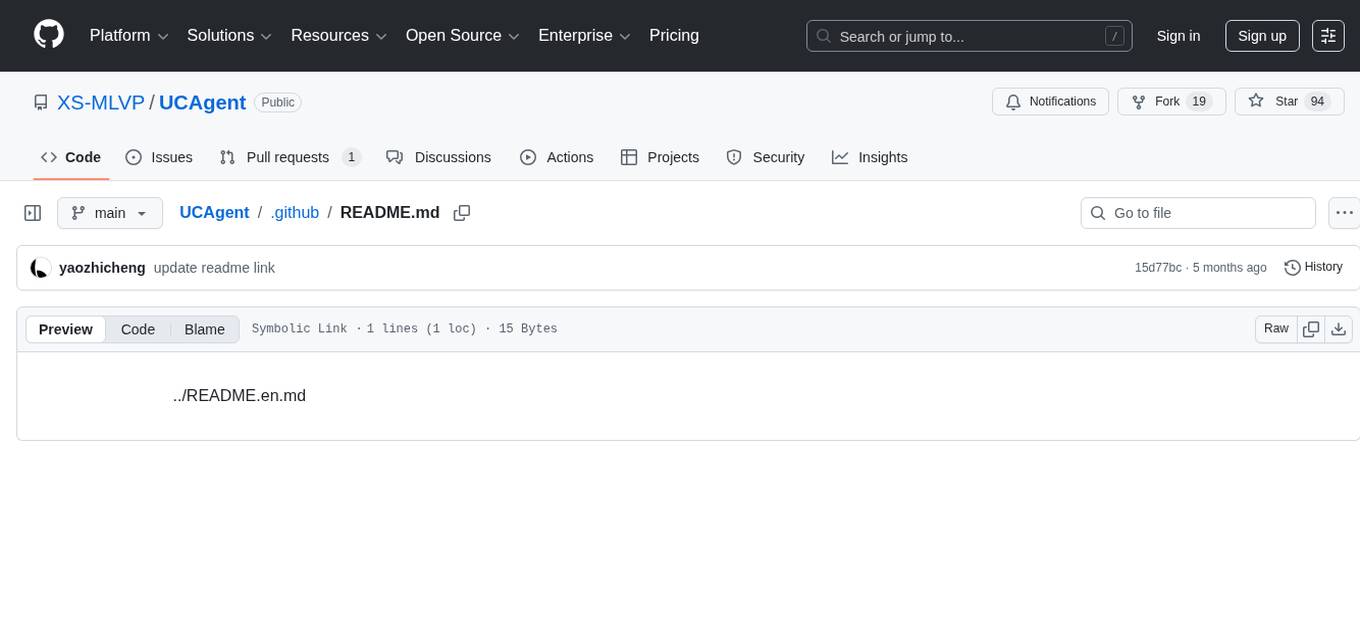
UCAgent
UCAgent is an AI-powered automated UT verification agent for chip design. It automates chip verification workflow, supports functional and code coverage analysis, ensures consistency among documentation, code, and reports, and collaborates with mainstream Code Agents via MCP protocol. It offers three intelligent interaction modes and requires Python 3.11+, Linux/macOS OS, 4GB+ memory, and access to an AI model API. Users can clone the repository, install dependencies, configure qwen, and start verification. UCAgent supports various verification quality improvement options and basic operations through TUI shortcuts and stage color indicators. It also provides documentation build and preview using MkDocs, PDF manual build using Pandoc + XeLaTeX, and resources for further help and contribution.
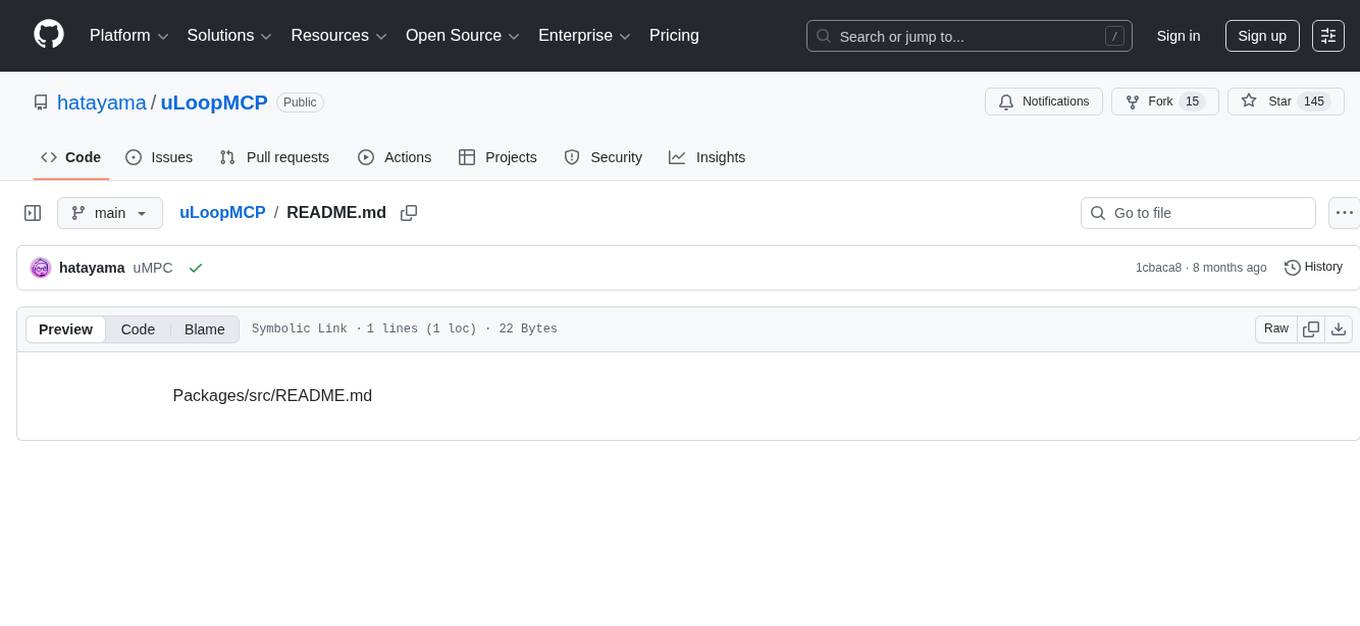
uLoopMCP
uLoopMCP is a Unity integration tool designed to let AI drive your Unity project forward with minimal human intervention. It provides a 'self-hosted development loop' where an AI can compile, run tests, inspect logs, and fix issues using tools like compile, run-tests, get-logs, and clear-console. It also allows AI to operate the Unity Editor itself—creating objects, calling menu items, inspecting scenes, and refining UI layouts from screenshots via tools like execute-dynamic-code, execute-menu-item, and capture-window. The tool enables AI-driven development loops to run autonomously inside existing Unity projects.
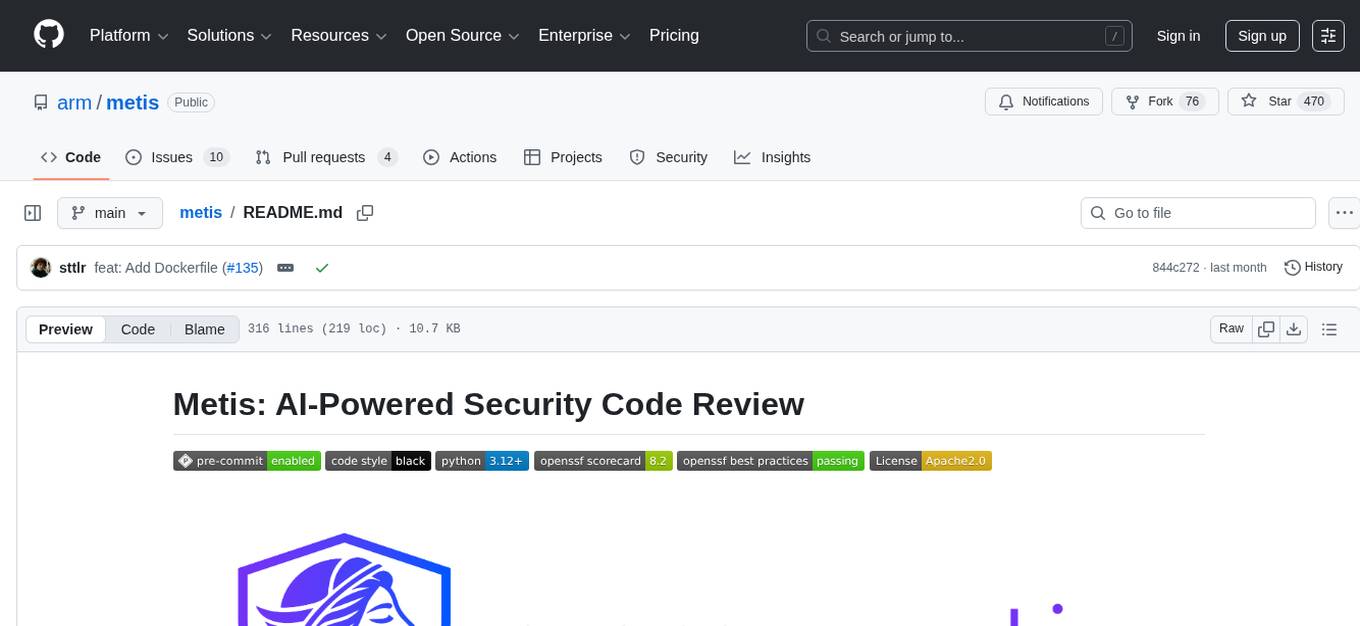
metis
Metis is an open-source, AI-driven tool for deep security code review, created by Arm's Product Security Team. It helps engineers detect subtle vulnerabilities, improve secure coding practices, and reduce review fatigue. Metis uses LLMs for semantic understanding and reasoning, RAG for context-aware reviews, and supports multiple languages and vector store backends. It provides a plugin-friendly and extensible architecture, named after the Greek goddess of wisdom, Metis. The tool is designed for large, complex, or legacy codebases where traditional tooling falls short.

graphiti
Graphiti is a framework for building and querying temporally-aware knowledge graphs, tailored for AI agents in dynamic environments. It continuously integrates user interactions, structured and unstructured data, and external information into a coherent, queryable graph. The framework supports incremental data updates, efficient retrieval, and precise historical queries without complete graph recomputation, making it suitable for developing interactive, context-aware AI applications.
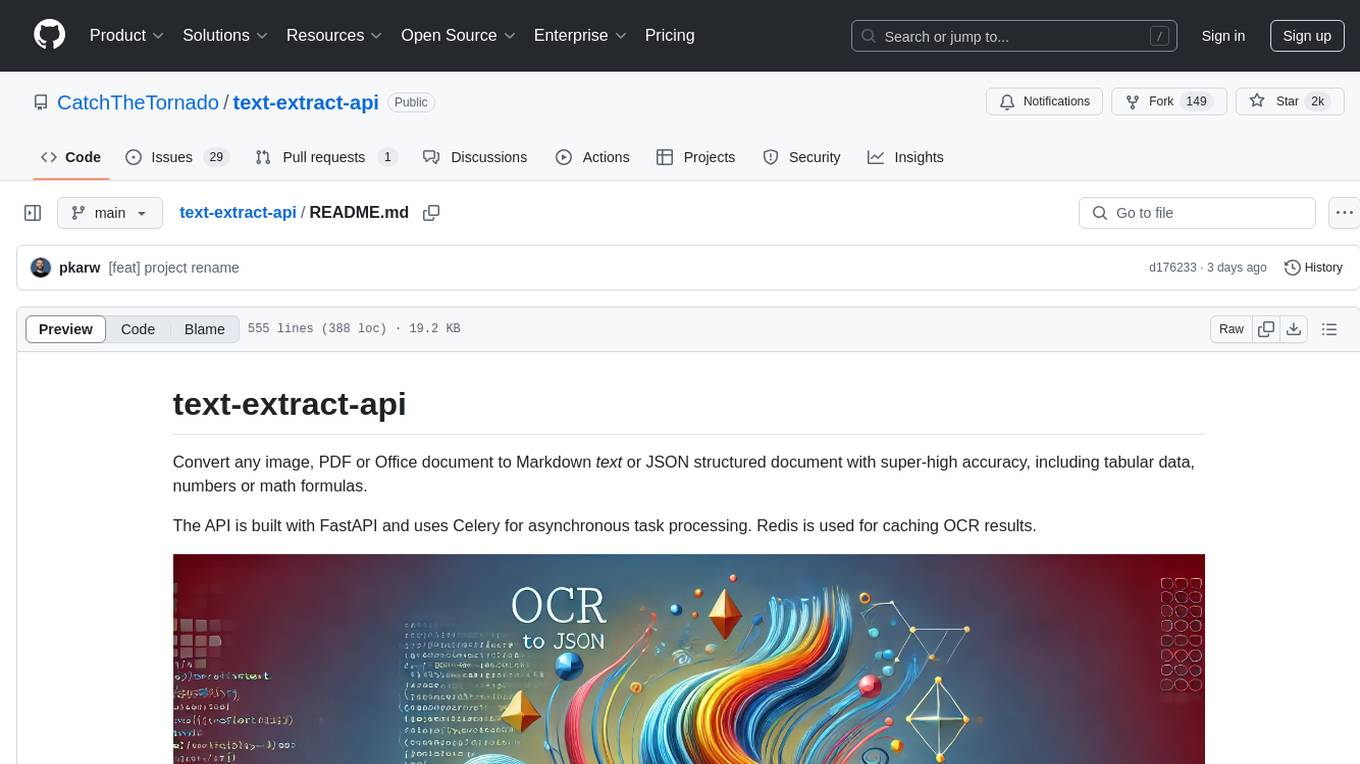
text-extract-api
The text-extract-api is a powerful tool that allows users to convert images, PDFs, or Office documents to Markdown text or JSON structured documents with high accuracy. It is built using FastAPI and utilizes Celery for asynchronous task processing, with Redis for caching OCR results. The tool provides features such as PDF/Office to Markdown and JSON conversion, improving OCR results with LLama, removing Personally Identifiable Information from documents, distributed queue processing, caching using Redis, switchable storage strategies, and a CLI tool for task management. Users can run the tool locally or on cloud services, with support for GPU processing. The tool also offers an online demo for testing purposes.
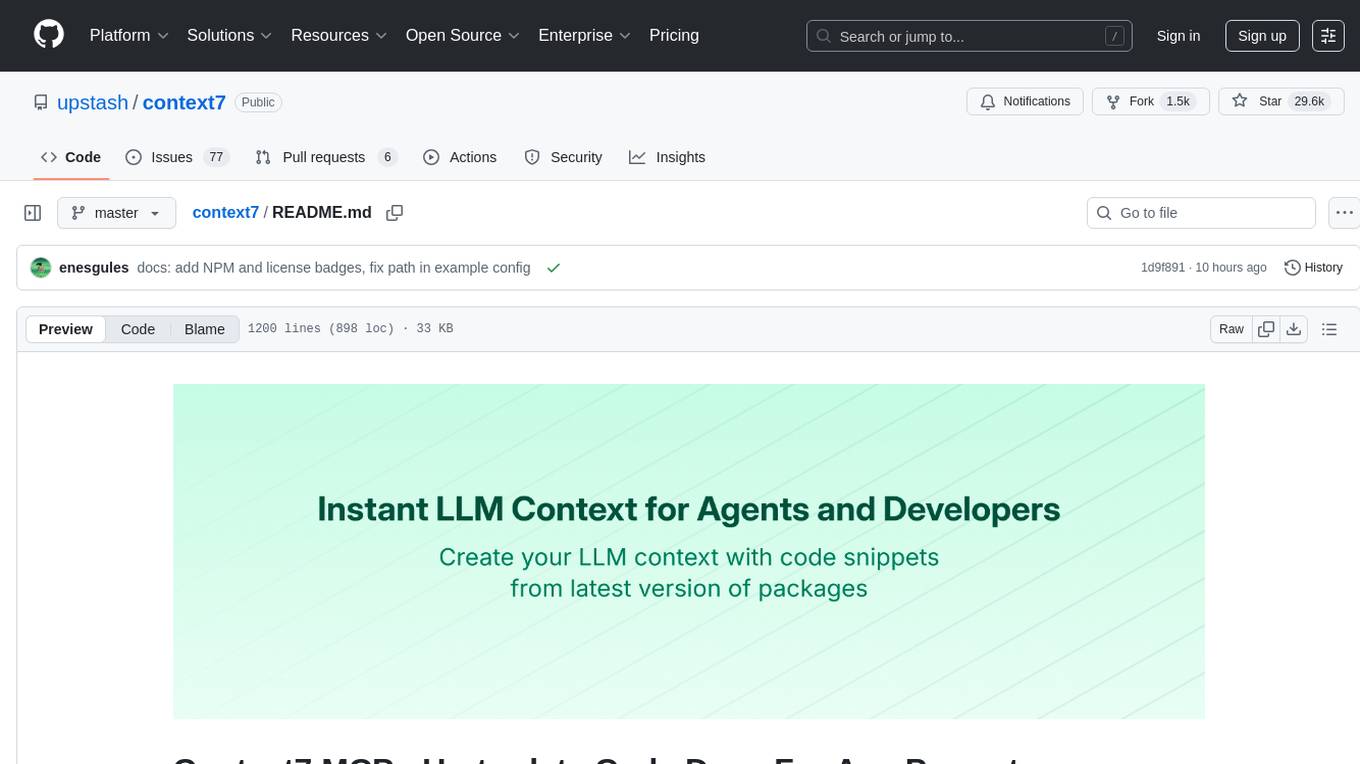
context7
Context7 is a powerful tool for analyzing and visualizing data in various formats. It provides a user-friendly interface for exploring datasets, generating insights, and creating interactive visualizations. With advanced features such as data filtering, aggregation, and customization, Context7 is suitable for both beginners and experienced data analysts. The tool supports a wide range of data sources and formats, making it versatile for different use cases. Whether you are working on exploratory data analysis, data visualization, or data storytelling, Context7 can help you uncover valuable insights and communicate your findings effectively.
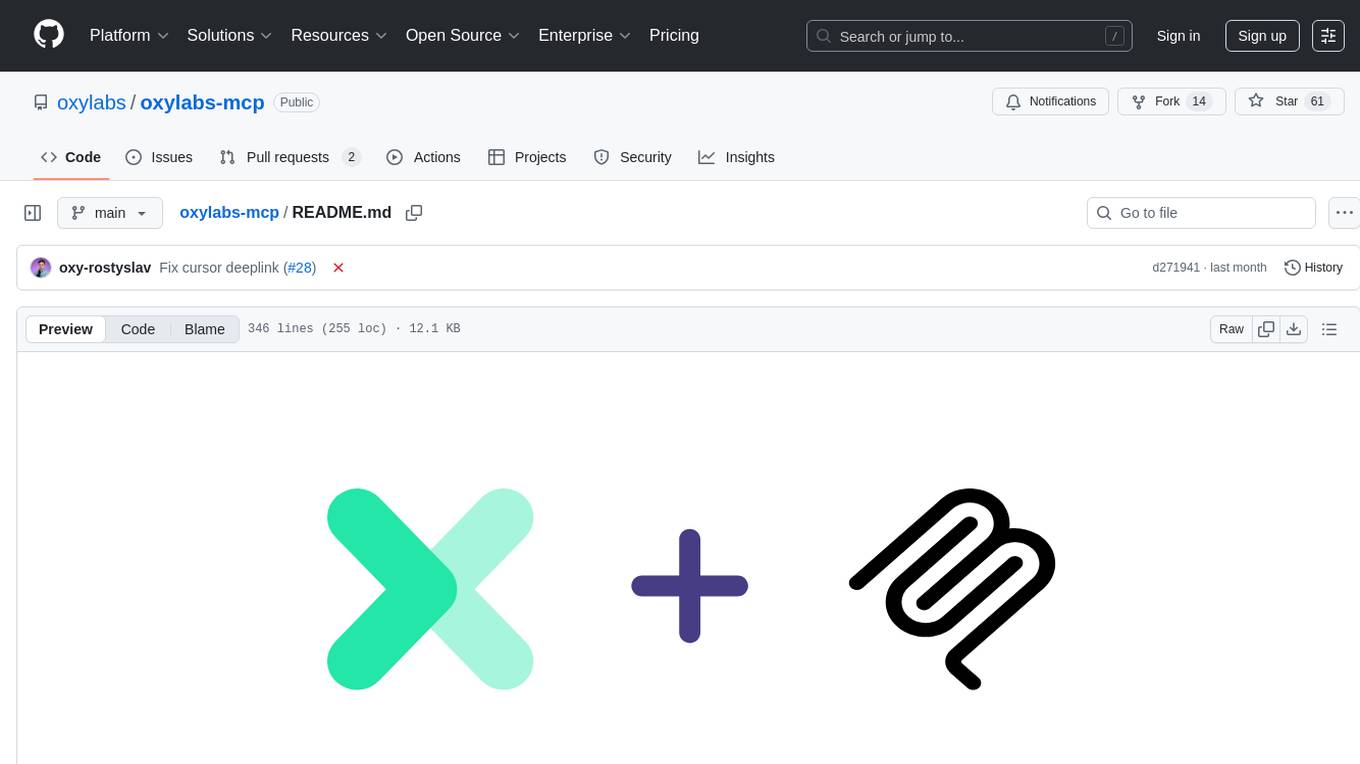
oxylabs-mcp
The Oxylabs MCP Server acts as a bridge between AI models and the web, providing clean, structured data from any site. It enables scraping of URLs, rendering JavaScript-heavy pages, content extraction for AI use, bypassing anti-scraping measures, and accessing geo-restricted web data from 195+ countries. The implementation utilizes the Model Context Protocol (MCP) to facilitate secure interactions between AI assistants and web content. Key features include scraping content from any site, automatic data cleaning and conversion, bypassing blocks and geo-restrictions, flexible setup with cross-platform support, and built-in error handling and request management.
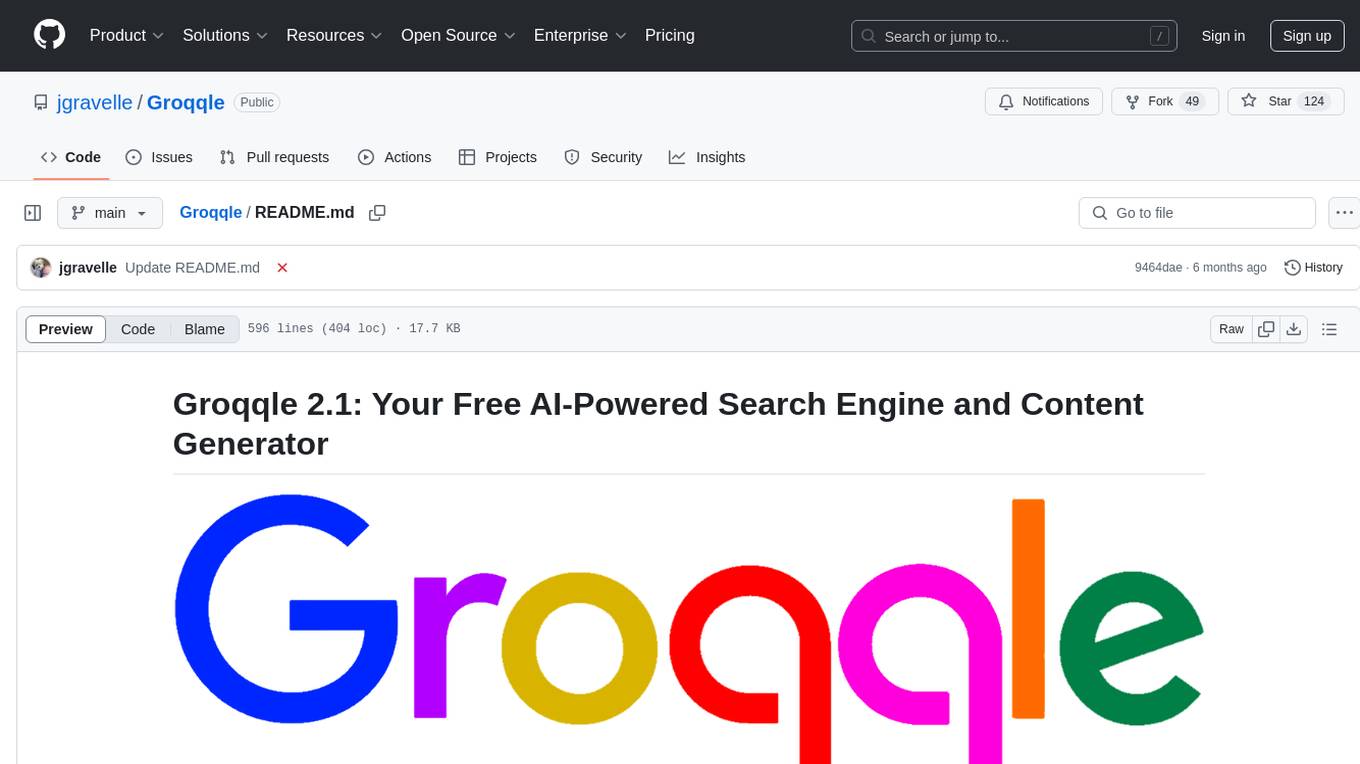
Groqqle
Groqqle 2.1 is a revolutionary, free AI web search and API that instantly returns ORIGINAL content derived from source articles, websites, videos, and even foreign language sources, for ANY target market of ANY reading comprehension level! It combines the power of large language models with advanced web and news search capabilities, offering a user-friendly web interface, a robust API, and now a powerful Groqqle_web_tool for seamless integration into your projects. Developers can instantly incorporate Groqqle into their applications, providing a powerful tool for content generation, research, and analysis across various domains and languages.
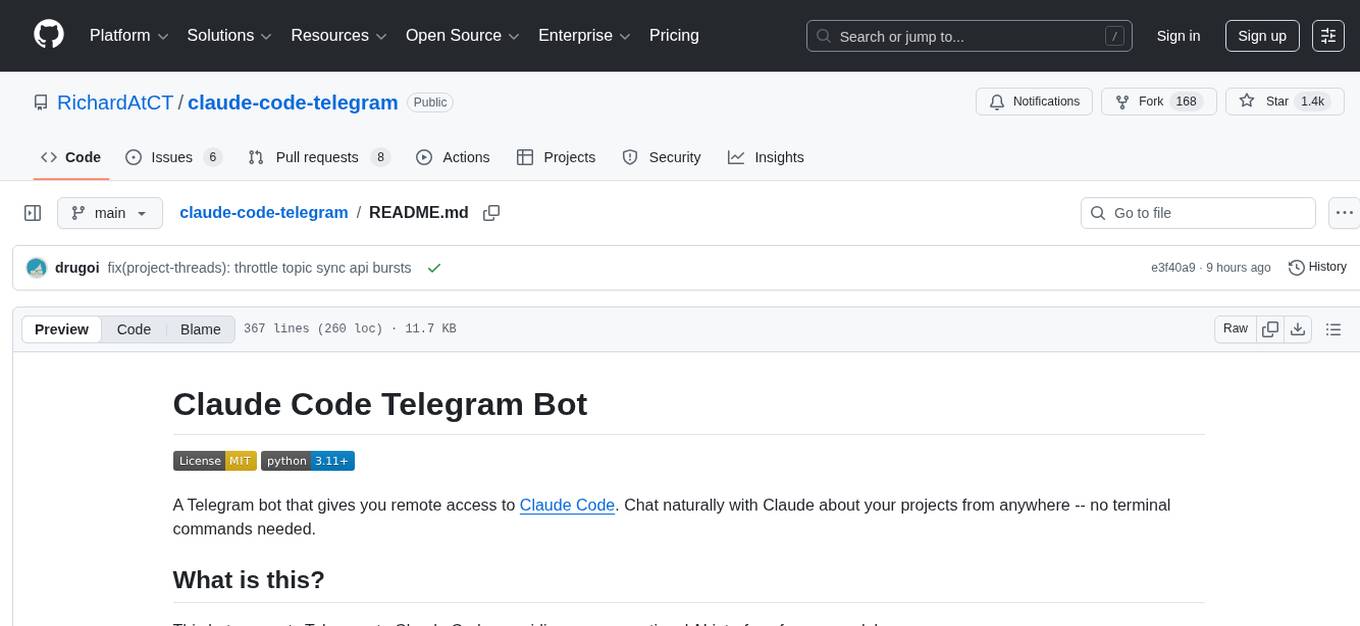
claude-code-telegram
Claude Code Telegram Bot is a Telegram bot that connects to Claude Code, offering a conversational AI interface for codebases. Users can chat naturally with Claude to analyze, edit, or explain code, maintain context across conversations, code on the go, receive proactive notifications, and stay secure with authentication and audit logging. The bot supports two interaction modes: Agentic Mode for natural language interaction and Classic Mode for a terminal-like interface. It features event-driven automation, working features like directory sandboxing and git integration, and planned enhancements like a plugin system. Security measures include access control, directory isolation, rate limiting, input validation, and webhook authentication.
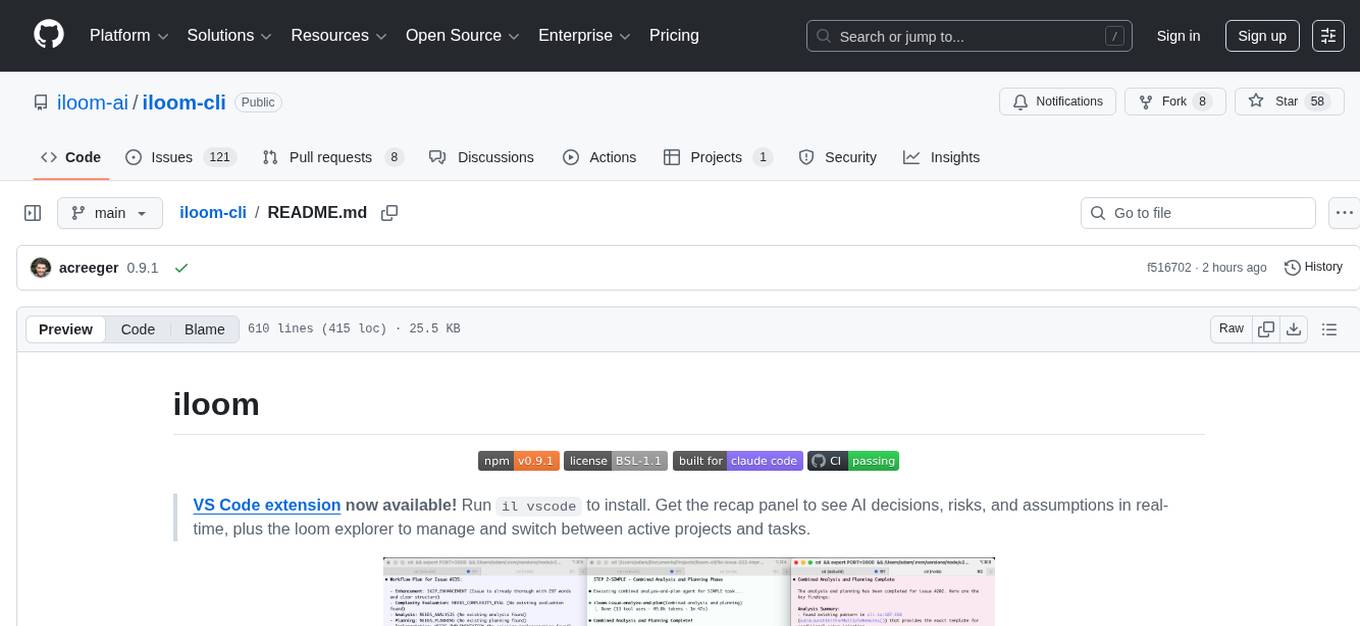
iloom-cli
iloom is a tool designed to streamline AI-assisted development by focusing on maintaining alignment between human developers and AI agents. It treats context as a first-class concern, persisting AI reasoning in issue comments rather than temporary chats. The tool allows users to collaborate with AI agents in an isolated environment, switch between complex features without losing context, document AI decisions publicly, and capture key insights and lessons learned from AI sessions. iloom is not just a tool for managing git worktrees, but a control plane for maintaining alignment between users and their AI assistants.
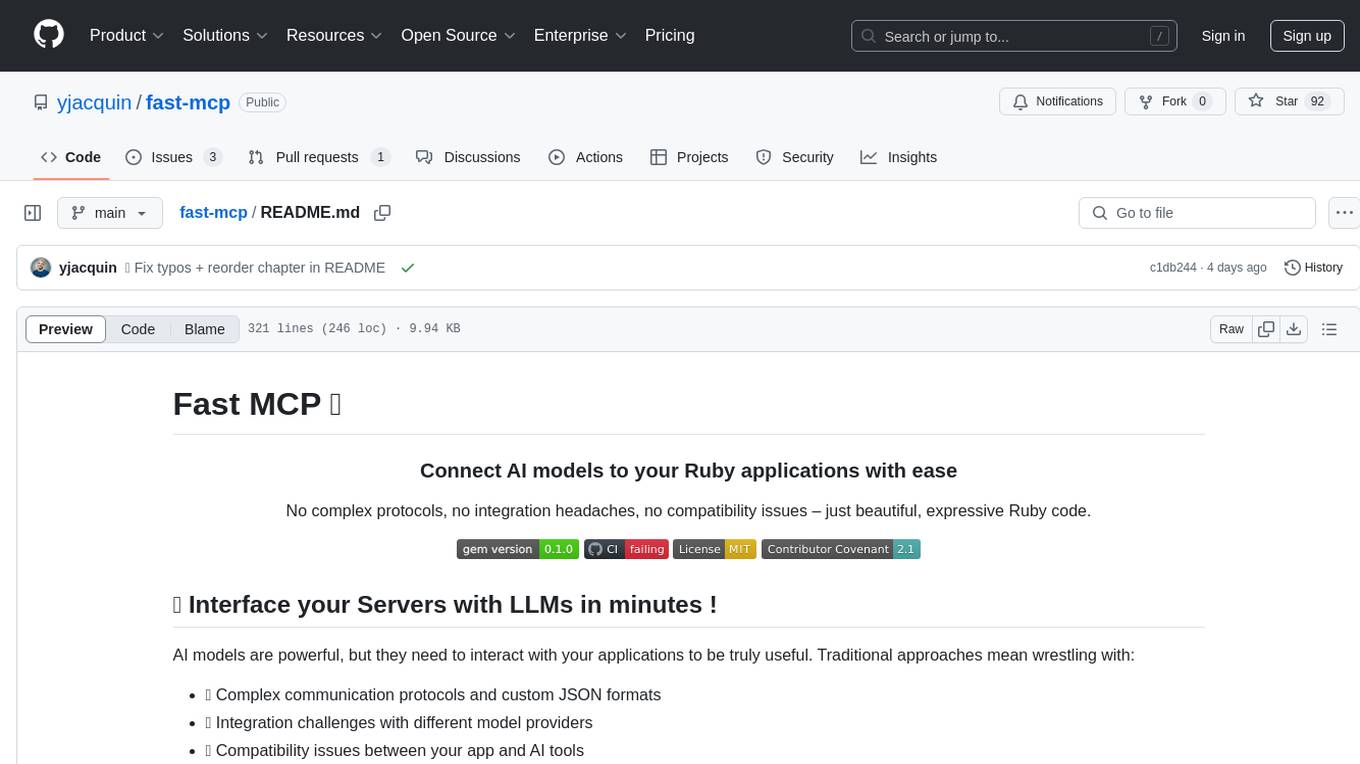
fast-mcp
Fast MCP is a Ruby gem that simplifies the integration of AI models with your Ruby applications. It provides a clean implementation of the Model Context Protocol, eliminating complex communication protocols, integration challenges, and compatibility issues. With Fast MCP, you can easily connect AI models to your servers, share data resources, choose from multiple transports, integrate with frameworks like Rails and Sinatra, and secure your AI-powered endpoints. The gem also offers real-time updates and authentication support, making AI integration a seamless experience for developers.
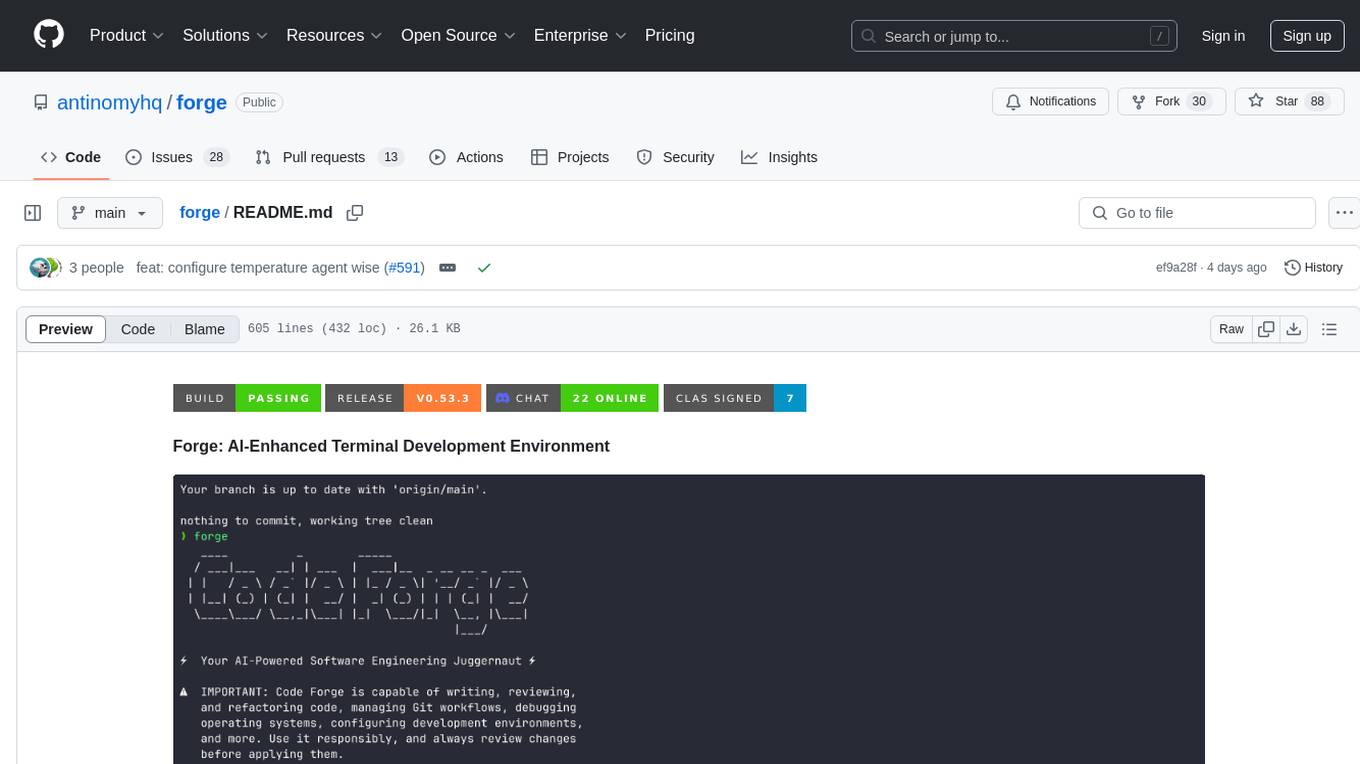
forge
Forge is a powerful open-source tool for building modern web applications. It provides a simple and intuitive interface for developers to quickly scaffold and deploy projects. With Forge, you can easily create custom components, manage dependencies, and streamline your development workflow. Whether you are a beginner or an experienced developer, Forge offers a flexible and efficient solution for your web development needs.
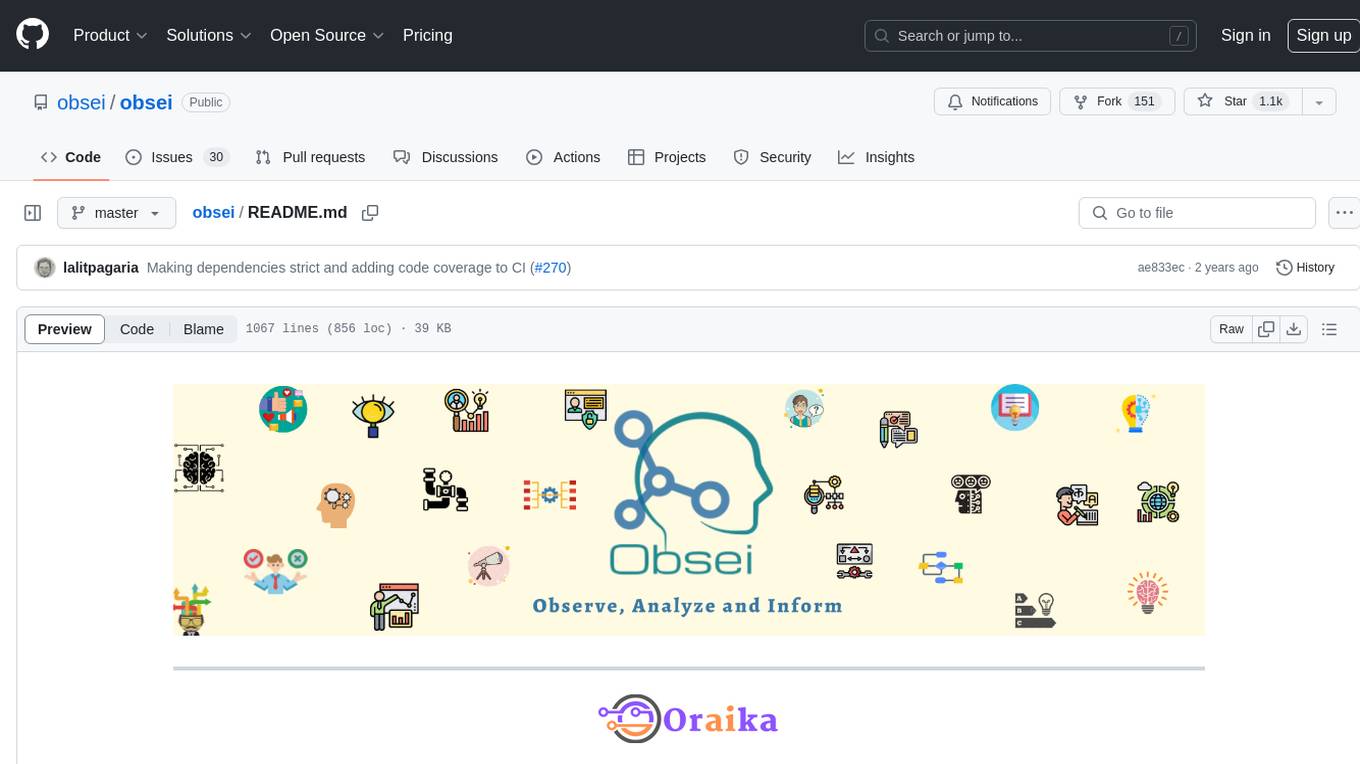
obsei
Obsei is an open-source, low-code, AI powered automation tool that consists of an Observer to collect unstructured data from various sources, an Analyzer to analyze the collected data with various AI tasks, and an Informer to send analyzed data to various destinations. The tool is suitable for scheduled jobs or serverless applications as all Observers can store their state in databases. Obsei is still in alpha stage, so caution is advised when using it in production. The tool can be used for social listening, alerting/notification, automatic customer issue creation, extraction of deeper insights from feedbacks, market research, dataset creation for various AI tasks, and more based on creativity.
For similar tasks

LEANN
LEANN is an innovative vector database that democratizes personal AI, transforming your laptop into a powerful RAG system that can index and search through millions of documents using 97% less storage than traditional solutions without accuracy loss. It achieves this through graph-based selective recomputation and high-degree preserving pruning, computing embeddings on-demand instead of storing them all. LEANN allows semantic search of file system, emails, browser history, chat history, codebase, or external knowledge bases on your laptop with zero cloud costs and complete privacy. It is a drop-in semantic search MCP service fully compatible with Claude Code, enabling intelligent retrieval without changing your workflow.

anything-llm
AnythingLLM is a full-stack application that enables you to turn any document, resource, or piece of content into context that any LLM can use as references during chatting. This application allows you to pick and choose which LLM or Vector Database you want to use as well as supporting multi-user management and permissions.

danswer
Danswer is an open-source Gen-AI Chat and Unified Search tool that connects to your company's docs, apps, and people. It provides a Chat interface and plugs into any LLM of your choice. Danswer can be deployed anywhere and for any scale - on a laptop, on-premise, or to cloud. Since you own the deployment, your user data and chats are fully in your own control. Danswer is MIT licensed and designed to be modular and easily extensible. The system also comes fully ready for production usage with user authentication, role management (admin/basic users), chat persistence, and a UI for configuring Personas (AI Assistants) and their Prompts. Danswer also serves as a Unified Search across all common workplace tools such as Slack, Google Drive, Confluence, etc. By combining LLMs and team specific knowledge, Danswer becomes a subject matter expert for the team. Imagine ChatGPT if it had access to your team's unique knowledge! It enables questions such as "A customer wants feature X, is this already supported?" or "Where's the pull request for feature Y?"

infinity
Infinity is an AI-native database designed for LLM applications, providing incredibly fast full-text and vector search capabilities. It supports a wide range of data types, including vectors, full-text, and structured data, and offers a fused search feature that combines multiple embeddings and full text. Infinity is easy to use, with an intuitive Python API and a single-binary architecture that simplifies deployment. It achieves high performance, with 0.1 milliseconds query latency on million-scale vector datasets and up to 15K QPS.

trieve
Trieve is an advanced relevance API for hybrid search, recommendations, and RAG. It offers a range of features including self-hosting, semantic dense vector search, typo tolerant full-text/neural search, sub-sentence highlighting, recommendations, convenient RAG API routes, the ability to bring your own models, hybrid search with cross-encoder re-ranking, recency biasing, tunable popularity-based ranking, filtering, duplicate detection, and grouping. Trieve is designed to be flexible and customizable, allowing users to tailor it to their specific needs. It is also easy to use, with a simple API and well-documented features.
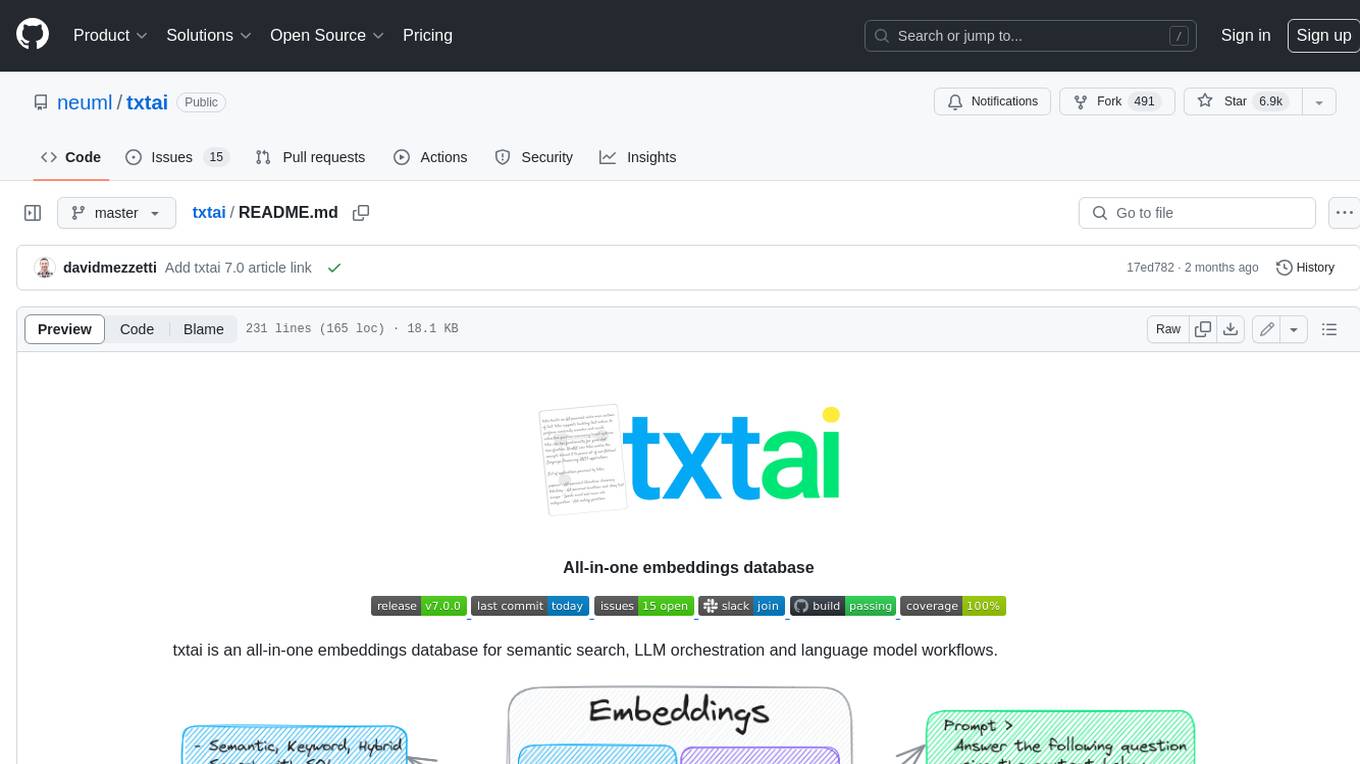
txtai
Txtai is an all-in-one embeddings database for semantic search, LLM orchestration, and language model workflows. It combines vector indexes, graph networks, and relational databases to enable vector search with SQL, topic modeling, retrieval augmented generation, and more. Txtai can stand alone or serve as a knowledge source for large language models (LLMs). Key features include vector search with SQL, object storage, topic modeling, graph analysis, multimodal indexing, embedding creation for various data types, pipelines powered by language models, workflows to connect pipelines, and support for Python, JavaScript, Java, Rust, and Go. Txtai is open-source under the Apache 2.0 license.
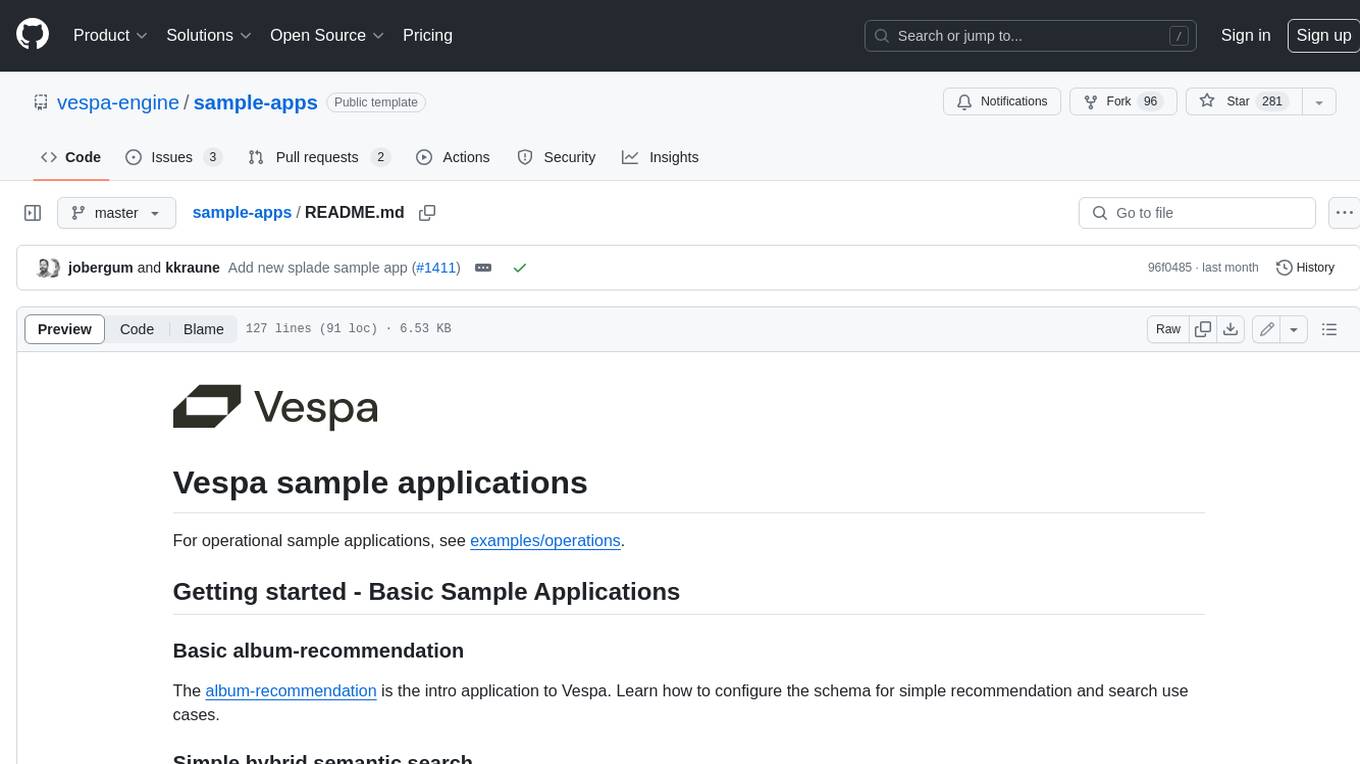
sample-apps
Vespa is an open-source search and AI engine that provides a unified platform for building and deploying search and AI applications. Vespa sample applications showcase various use cases and features of Vespa, including basic search, recommendation, semantic search, image search, text ranking, e-commerce search, question answering, search-as-you-type, and ML inference serving.
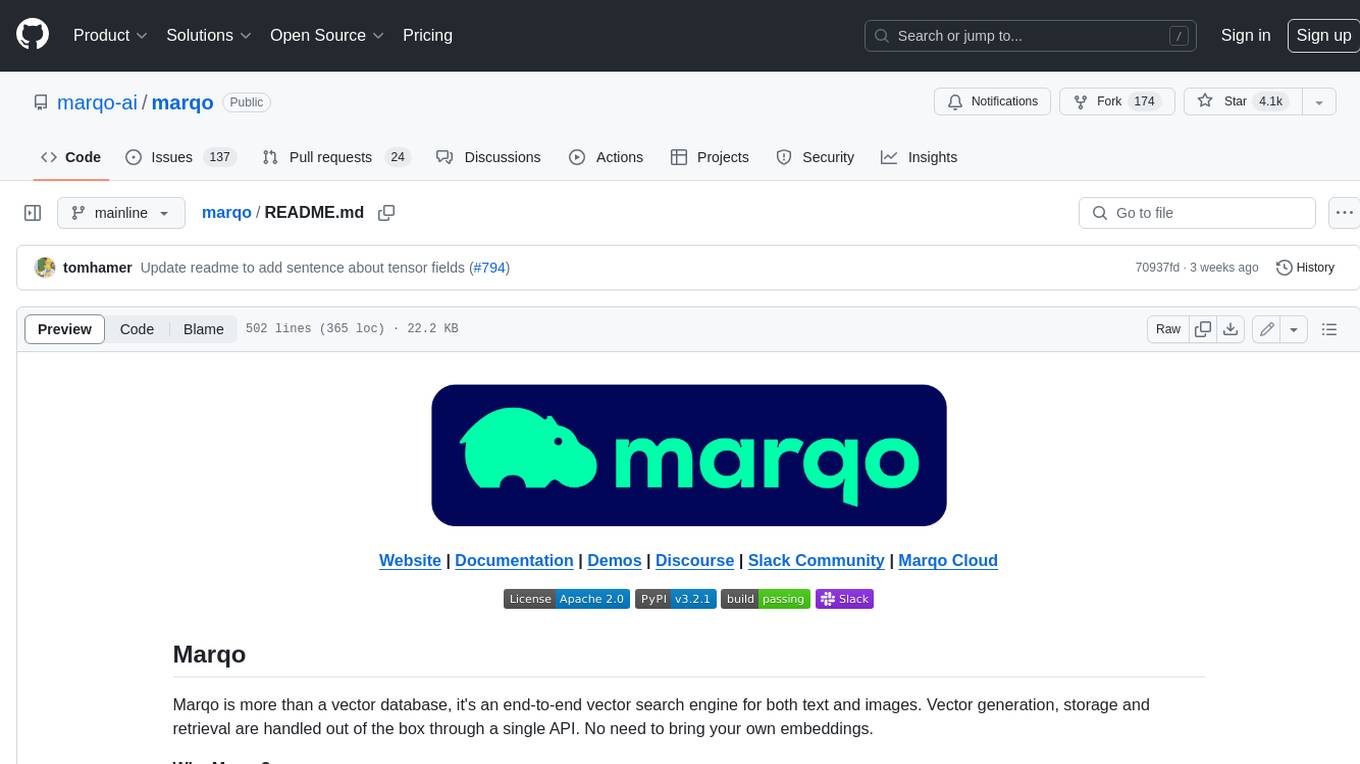
marqo
Marqo is more than a vector database, it's an end-to-end vector search engine for both text and images. Vector generation, storage and retrieval are handled out of the box through a single API. No need to bring your own embeddings.
For similar jobs

sweep
Sweep is an AI junior developer that turns bugs and feature requests into code changes. It automatically handles developer experience improvements like adding type hints and improving test coverage.

teams-ai
The Teams AI Library is a software development kit (SDK) that helps developers create bots that can interact with Teams and Microsoft 365 applications. It is built on top of the Bot Framework SDK and simplifies the process of developing bots that interact with Teams' artificial intelligence capabilities. The SDK is available for JavaScript/TypeScript, .NET, and Python.

ai-guide
This guide is dedicated to Large Language Models (LLMs) that you can run on your home computer. It assumes your PC is a lower-end, non-gaming setup.

classifai
Supercharge WordPress Content Workflows and Engagement with Artificial Intelligence. Tap into leading cloud-based services like OpenAI, Microsoft Azure AI, Google Gemini and IBM Watson to augment your WordPress-powered websites. Publish content faster while improving SEO performance and increasing audience engagement. ClassifAI integrates Artificial Intelligence and Machine Learning technologies to lighten your workload and eliminate tedious tasks, giving you more time to create original content that matters.

chatbot-ui
Chatbot UI is an open-source AI chat app that allows users to create and deploy their own AI chatbots. It is easy to use and can be customized to fit any need. Chatbot UI is perfect for businesses, developers, and anyone who wants to create a chatbot.

BricksLLM
BricksLLM is a cloud native AI gateway written in Go. Currently, it provides native support for OpenAI, Anthropic, Azure OpenAI and vLLM. BricksLLM aims to provide enterprise level infrastructure that can power any LLM production use cases. Here are some use cases for BricksLLM: * Set LLM usage limits for users on different pricing tiers * Track LLM usage on a per user and per organization basis * Block or redact requests containing PIIs * Improve LLM reliability with failovers, retries and caching * Distribute API keys with rate limits and cost limits for internal development/production use cases * Distribute API keys with rate limits and cost limits for students

uAgents
uAgents is a Python library developed by Fetch.ai that allows for the creation of autonomous AI agents. These agents can perform various tasks on a schedule or take action on various events. uAgents are easy to create and manage, and they are connected to a fast-growing network of other uAgents. They are also secure, with cryptographically secured messages and wallets.

griptape
Griptape is a modular Python framework for building AI-powered applications that securely connect to your enterprise data and APIs. It offers developers the ability to maintain control and flexibility at every step. Griptape's core components include Structures (Agents, Pipelines, and Workflows), Tasks, Tools, Memory (Conversation Memory, Task Memory, and Meta Memory), Drivers (Prompt and Embedding Drivers, Vector Store Drivers, Image Generation Drivers, Image Query Drivers, SQL Drivers, Web Scraper Drivers, and Conversation Memory Drivers), Engines (Query Engines, Extraction Engines, Summary Engines, Image Generation Engines, and Image Query Engines), and additional components (Rulesets, Loaders, Artifacts, Chunkers, and Tokenizers). Griptape enables developers to create AI-powered applications with ease and efficiency.


-lightgrey)









